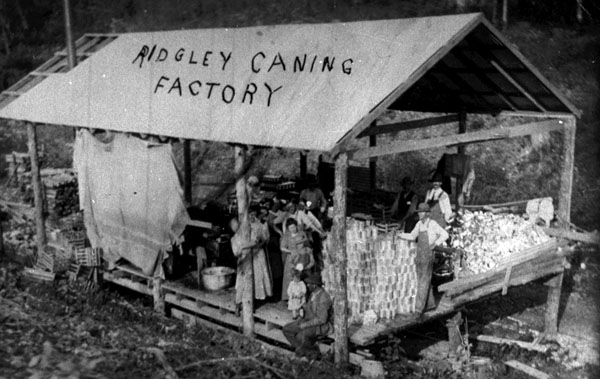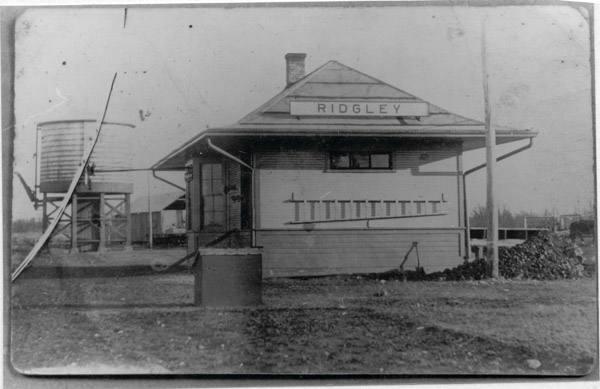Ridgley by Alta Coffey
The Missouri North Arkansas Railroad came through Ridgley in 1906 and 07. Ridgley was plotted out in 1907. Originally the town site was Joe Stamps hay field. He signed a lease for 99 years for the railroad right-of-way that came through his farm. The first building was built in 1907 by a Mr. Coolie. He had a store in the front and Iived in the back. The house still stands and is owned by Lloyd Birchfield. The next was built by W.R. (Nap) Birkes. He and his brother, Charley Birkes, were building a concrete building for a general merchandise store. That was in 1909, or 10 at about the same time a Dr. Senseney built a large frame building for a dwelling, doctors office and clinic. He later sold to Jim Sims who turned it into a hotel. The depot and water tank was built in 1907 or 08. In 1910, or 11 a Mr. J.C. Crane and son, Calvin, built a building and put in a store also a 2-story dwelling house. The post office was in a corner of his store; Bessie Stamps was postmaster.
The little town of Ridgley was beginning to make itself known. Stock pens were built and the cattle were brought out of the hills and shipped. It all had a western flavor with men on horses bringing the cattle in. There were also hogs and sheep shipped. Calvin Stamps had a timber yard where he bought railroad ties and mining timbers. Calvin Stamps and Boyd Northcutt built a tomato canning factory, they piped the water from the railroad water tank. Boyd and Epp Northcutt had a produce market-place where they brought eggs, chickens, cream and other farm produce. W.R. (Nap) Birkes had a grist mill where he ground cornmeal, made stock feed such as corn chops, wheat bran and shorts and whole wheat flour.
Up to 1912 there was no school, the children had to walk to Liberty Hill down in Layton Hollow. The population was growing in Ridgley and the good citizens thought the school should be moved to Ridgley so they met in the spring of 1913 to vote to move the school, J .C. Stamps, Calvin Stamps, the Northcutts, Birkes and several more. Of course, the people in Layton Hollow wanted the school left there so there were hard feelings. But Ridgley won. At this time there were a good population as people had built homes. In the year 1913 J.C. Stamps and Birt Crabb started building a school house. Frank Coffey and sons, Tom and Henry Coffey furnished the oak farming. The first teacher in the fall of 1913 was Oma Packwood. J.C. Stamps had a blacksmith shop where he shod horses and kept peoples plows sharpened and the wagons and buggies in running order.
Calvin Stamps traded his farm that lays east of Ridgley to Charley Birkes for his one half interest in the Birkes Bros. Store and bought the nice home that Boyd Northcutt had built and moved his family into it. There were no church buildings so all denominations used the school house for worship. The school house served as a community center. The young people put on plays, and there was a literary meeting once a month, there were also singings. Elbert and Pearly Davidson were depot agents. There were several different section foremen. Some of the people that were citizens were: Smith, Dunbar, Scroggins, Mullins, Stamps, Birkes, Northcutt, Crane, Horner, Charles, Haynes, Packwood, Burris, Laney, Beck, Ellender, Metcalf, Thomas, Raines, Brattin, Parmley and Nelson. When strawberry growing was in its heyday there was a shed built on the side track between the depot and water tank for the buying and shipping of strawberries. There were several cars of berries shipped from Ridgley. In 1918 J.C. Stamps and sons built a store building and post office. Bessie Stamps was still postmaster. The law element was J.C. Stamps as Justice of the Peace, and Butler Mullins was Constable. About once a month court was held in Judge J.C. Stamps blacksmith shop. He had lots of cases. Lawyers would come from Cassville. Most of the cases were over breaking the peace or quarrels between neighbors. No, our little town, today, is not the place that I, Alta Stamps Coffey, grew up in. Many of the older buildings are gone or in disrepair. |



